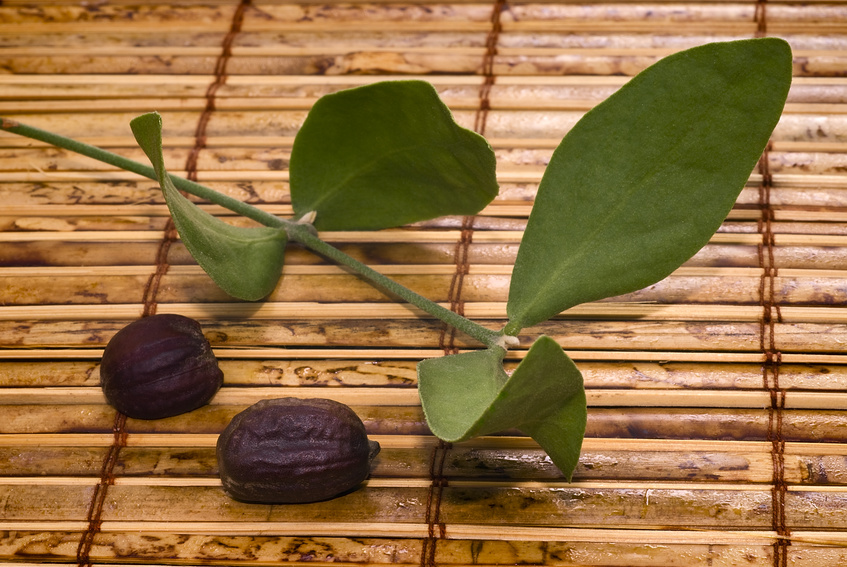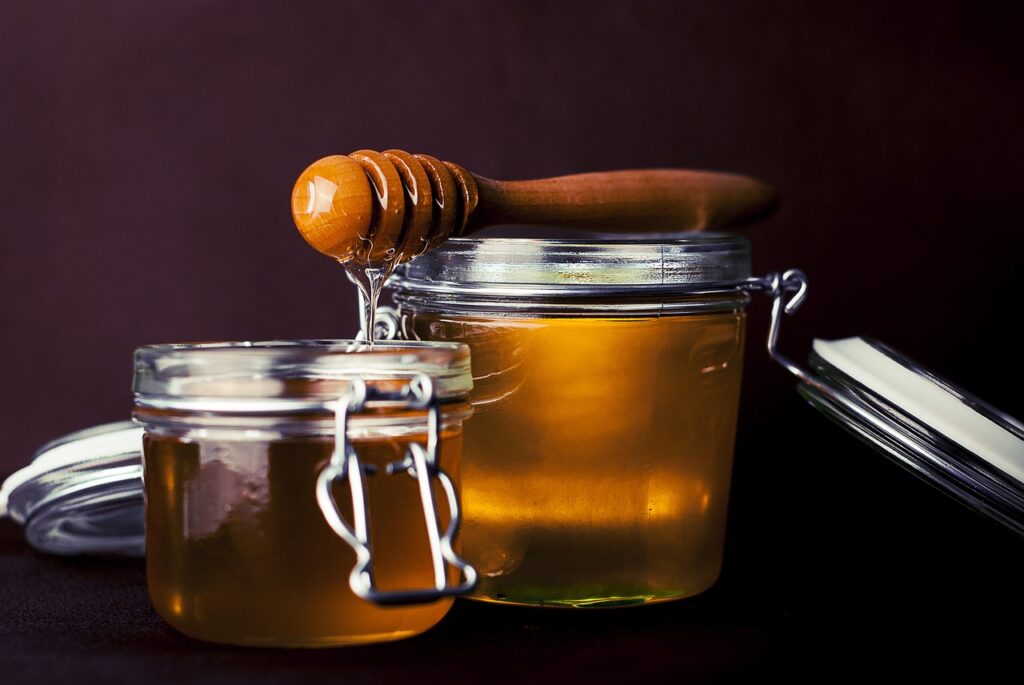Jojoba Oil for Hair: 3 Amazing Benefits – Feeling Beautiful?
Nature provides countless beauty treasures, and jojoba oil is one of the best. Extracted from the seeds of the Simmondsia chinensis plant, which grows in the arid regions of Southwestern North America, this golden liquid isn’t actually an oil at all; it’s a liquid wax ester.
Its structure closely resembles the natural sebum produced by human skin, making it especially compatible with our hair and scalp.
- Jojoba Oil for Hair
- Jojoba Oil Treatments for Hair and Scalp
- Misconceptions About Jojoba Oil
- Jojoba Oil Applications
- Wrap-up
- Jojoba Oil for Hair FAQs
- What are the key benefits of using jojoba oil for hair care?
- Can jojoba oil promote hair growth?
- How often should I apply jojoba oil to my hair?
- Is jojoba oil suitable for all hair types?
- How do I use jojoba oil as a hair treatment?
- Can jojoba oil be used as a leave-in conditioner?
- Will jojoba oil help with a dry, itchy scalp?
- How does jojoba oil protect hair from damage?
- Does jojoba oil have benefits for color-treated hair?
- What vitamins and nutrients are in jojoba oil?
- Can jojoba oil reduce frizz and flyaways?
- Can jojoba oil protect hair from heat styling?
- Can jojoba oil replace conditioner?
- How does jojoba oil compare to coconut oil for hair?
- Does jojoba oil help with dandruff?
- Is organic jojoba oil better?
- What is the shelf life of jojoba oil, and how should it be stored?
- Can I mix jojoba oil with other oils for added benefits?
Jojoba oil is similar to human skin oil in that it helps balance the production of skin sebum and is structured as a very long straight-chain wax ester. There are many natural beauty wonders of jojoba oil as well. To name a few, jojoba oil is wonderful for acne treatments, healing wounds, hair loss prevention, hair conditioning, and more.
People with acne-prone or sensitive skin love jojoba oil because it’s gentle and non-comedogenic, meaning it won’t clog pores. Beyond skincare, this natural multitasker also supports hair growth, hydration, and repair, making it a must-have for your natural beauty routine.
Jojoba Oil for Hair
One of the best natural remedies for hair health and growth is jojoba oil. It deeply moisturizes without leaving a greasy residue and helps prevent moisture loss from the scalp. To understand how it works, let’s briefly look at how hair grows.
Each strand of hair grows from a follicle, and inside that follicle is a sebaceous gland that produces sebum, the scalp’s natural oil. As new hair forms, it’s coated with sebum, which nourishes and protects it. However, when too much sebum and debris accumulate, hair follicles can become clogged, leading to irritation, buildup, and even blocked hair growth.
Jojoba oil closely mimics the sebum produced by our own skin, allowing it to penetrate the scalp and dissolve excess oil, buildup, and impurities. This helps clear the way for new, healthy hair to grow.
Jojoba Oil Treatments for Hair and Scalp
Unlike many commercial hair products, jojoba oil is completely natural, gentle, and free from harsh chemicals. It nourishes the scalp, strengthens the hair shaft, and restores shine, all while avoiding the dryness and irritation that some synthetic products cause.
Below are a few ways jojoba oil can help improve hair and scalp health:
Scalp Psoriasis Relief
People who experience psoriasis often struggle with scalp dryness, flaking, and irritation that can look similar to dandruff. While prescription creams exist, they’re not always effective or easy to apply to hair.
Jojoba oil, on the other hand, spreads easily across the scalp thanks to its silky, liquid-wax consistency. It gently lifts away dead skin cells and excess sebum, helping to soothe the scalp and reduce dryness. The process is similar to the “oil dissolves oil” method used in skincare; natural oils help break down and remove excess buildup without stripping the skin of moisture.
Since it has anti-inflammatory properties as well (source), it soothes the irritation on the scalp, reduces swelling, and relieves itching. The vitamin E content of jojoba oil helps to restore and maintain healthy skin.
Frizzy, Dry Hair Treatment
Jojoba oil helps protect your hair’s natural oils from being stripped away by shampoo. To use it, apply a small amount to your hair before washing, this creates a barrier that locks in essential moisture. You can also apply a few drops to damp hair after washing to seal in hydration and smooth frizz.
Start with a small amount and adjust depending on your hair’s thickness and length, since a little truly goes a long way. Regular use before and after washing helps keep your hair soft, shiny, and manageable while protecting it from environmental dryness and damage.
Hair Loss Prevention
Hair loss can be influenced by diet, stress, hormonal changes, and aging. While losing 50 to 100 strands per day is completely normal, clogged hair follicles can sometimes make regrowth more difficult.
Jojoba oil helps by clearing away sebum buildup and dead skin, creating a healthier environment for new hair to grow. Its moisturizing and nourishing properties also support stronger, healthier strands that are less likely to break or shed prematurely.
Over time, consistent use can help your scalp stay balanced, allowing your hair to grow thicker and more resilient.
Therefore, if your hair is thinning due to blocked follicles, you should definitely use jojoba oil before trying anything more drastic. When you use it, add a few drops of peppermint oil to the mixture due to its similar properties of promoting hair growth (source). Rosemary essential oil also shows promise in terms of helping with hair loss, as described in multiple studies.
Even if your hair isn’t thinning, jojoba oil will nourish your scalp and prevent hair loss in the future. Due to the nature of the oil, it helps hair follicles to grow new hair strands more quickly by keeping them free and clear of any pollutants. It easily seeps into the follicles and dissolves the sebum buildup while nourishing your scalp at the same time.
Misconceptions About Jojoba Oil
While jojoba oil is proven to improve hair and scalp conditions, there are a few common misconceptions.
- “Jojoba oil is best for thicker hair, while almond oil is best for thinner hair.” False. Many people with thin hair who apply jojoba oil have achieved amazing results. It’s difficult to have a “one size fits all” for these kinds of things. Why not just try both to see what works best for your hair type?
- “Jojoba oil causes hair to fall out.” False. However, hair loss may be caused by other ingredients found in products that may be added to certain brands of jojoba oil. This is why it is important to read the labels first before purchasing any beauty product. Be sure to buy pure jojoba oil if you plan to apply it to your hair.
- “Jojoba oil smells terrible.” False. Pure jojoba oil has no smell at all. Other types of jojoba oil have a very weak, smoky smell but are not that strong. If, for some reason, you purchase a pure variation of jojoba oil that does smell less than desirable to you, just add a few drops of peppermint essential oil or another scent you’d prefer.
Jojoba Oil Applications
Applying jojoba oil is simple and versatile. Because every hair type is unique, it may take a little experimenting to find the method that works best for you. Whether you’re using it as a casual conditioner or a targeted treatment, jojoba oil can help restore softness, strength, and shine.
1. Pre-Wash Treatment
Apply a small amount of jojoba oil to your hair before shampooing and leave it on for about 20–30 minutes. You only need enough to lightly coat each strand. Some people prefer to leave it on overnight and rinse it out in the morning for deeper conditioning. Either way, you’ll notice softer, smoother hair after the first use.
2. Mix with Shampoo or Conditioner
You can also add a few drops of jojoba oil directly to your shampoo or conditioner. This method helps boost hydration and manageability without requiring a separate treatment step. Unlike coconut oil, jojoba oil doesn’t need to be melted, so it’s easier to mix and apply.
3. Leave-In Conditioner
If you prefer ongoing hydration, try using jojoba oil as a leave-in conditioner after washing your hair. Apply just a few drops to damp hair, focusing on the ends. It absorbs quickly and provides long-lasting protection from dryness and breakage. Be careful not to overapply—a little goes a long way for smooth, soft, and healthy-looking hair.
Wrap-up
Jojoba oil helps to improve the overall health of your hair and scalp. With proper application, it will make your hair livelier and moisturized, making you feel more beautiful.
Go ahead and see which application method works best for you. If you have a very dry scalp and don’t mind the feel of jojoba oil in your hair, I’d suggest leaving it in your hair all day for maximum effect.
Nature really does provide us with lots of helpful and amazing natural remedies. Jojoba oil will prove to be an invaluable addition to your natural beauty regimen if it isn’t already.
Jojoba Oil for Hair FAQs
What are the key benefits of using jojoba oil for hair care?
Jojoba oil is a powerhouse for hair health. It moisturizes the scalp, reduces dandruff, adds shine, and helps prevent breakage. Its composition closely mimics your scalp’s natural oils, which makes it perfect for restoring balance and maintaining smooth, manageable hair.
Can jojoba oil promote hair growth?
While jojoba oil doesn’t directly stimulate new hair growth, it creates the right conditions for it. By clearing blocked follicles, reducing dryness, and keeping the scalp balanced, it encourages stronger and healthier growth over time.
How often should I apply jojoba oil to my hair?
Once or twice a week is ideal for most hair types. You can apply it more often if your hair is dry or brittle. Start small and see how your hair responds before increasing the frequency.
Is jojoba oil suitable for all hair types?
Yes. Jojoba oil is lightweight and non-greasy, making it suitable for all hair types, from fine and straight to thick and curly. It helps balance oil production in oily hair and restores softness in dry or frizzy hair.
How do I use jojoba oil as a hair treatment?
Warm a small amount of jojoba oil in your hands and massage it into your scalp and hair. Leave it on for 30 minutes or overnight, then rinse with a mild shampoo. For extra shine and softness, follow up with a light conditioner.
Can jojoba oil be used as a leave-in conditioner?
Yes. Apply 2–3 drops of jojoba oil to damp or dry hair, concentrating on the ends. It detangles, softens, and adds a natural shine without making hair greasy.
Will jojoba oil help with a dry, itchy scalp?
Absolutely. Jojoba oil mimics natural scalp oils, allowing it to deeply moisturize and soothe irritation. It’s especially helpful for relieving dryness, flaking, or mild dandruff without leaving buildup behind.
How does jojoba oil protect hair from damage?
Jojoba oil coats each hair strand with a thin, protective layer that seals in moisture and reduces heat and environmental damage. It helps strengthen hair over time and minimizes split ends.
Does jojoba oil have benefits for color-treated hair?
Yes. Jojoba oil locks in moisture and smooths the hair cuticle, helping color last longer and look more vibrant. It also helps repair dryness often caused by coloring treatments.
What vitamins and nutrients are in jojoba oil?
Jojoba oil contains vitamin E, B-complex vitamins, zinc, and copper. These nutrients strengthen the scalp, support hair elasticity, and nourish roots for healthier, more resilient strands.
Can jojoba oil reduce frizz and flyaways?
Yes. A few drops of jojoba oil help smooth the hair cuticle and tame frizz. It also reduces static, leaving your hair soft and sleek throughout the day.
Can jojoba oil protect hair from heat styling?
Yes, it can serve as a natural heat protectant. Apply a small amount before blow drying or using heat tools to help prevent damage from high temperatures.
Can jojoba oil replace conditioner?
For some people, yes. Jojoba oil can serve as a natural, chemical-free conditioner that softens hair and restores shine without weighing it down.
How does jojoba oil compare to coconut oil for hair?
Coconut oil penetrates deeply but can feel heavy or cause buildup. Jojoba oil is lighter, easier to rinse out, and closer in composition to natural scalp oils, making it better for regular use.
Does jojoba oil help with dandruff?
Yes. It gently removes flakes and excess oil while keeping the scalp hydrated. Regular use can help balance scalp health and reduce dandruff caused by dryness or irritation.
Is organic jojoba oil better?
Organic, cold-pressed jojoba oil is the best option because it retains the highest concentration of vitamins and nutrients. Refined versions work well, too, but may have fewer active compounds.
What is the shelf life of jojoba oil, and how should it be stored?
Jojoba oil has an exceptionally long shelf life, up to five years, since it’s technically a liquid wax. Keep it in a cool, dark place in a tightly sealed bottle to maintain freshness and quality.
Can I mix jojoba oil with other oils for added benefits?
Yes. Jojoba oil blends beautifully with argan, rosemary, or castor oil for targeted benefits such as scalp stimulation, deep hydration, or shine enhancement. Mixing oils allows you to customize treatments for your specific hair needs.


